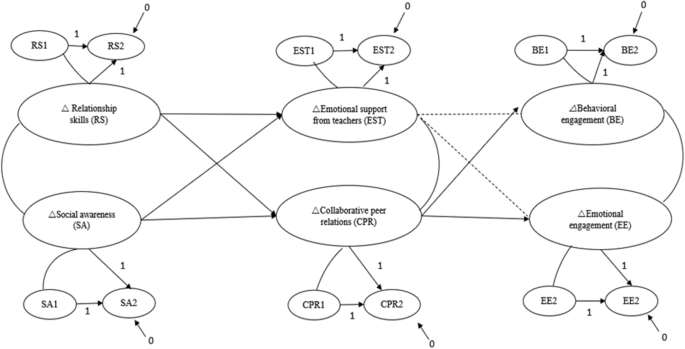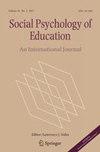社会胜任力、课堂关系与学业投入:初中生潜在变化评分模型方法
IF 3.2
2区 心理学
Q1 PSYCHOLOGY, EDUCATIONAL
引用次数: 0
摘要
摘要本纵向研究采用潜变评分(LCS)模型,考察学生(N = 1205)学业投入(行为和情感)、社会能力(关系技能和社会意识)和课堂关系(教师情感支持和合作同伴关系)的个体变化。调查了初中第一年的平均变化,并测试了一个LCS模型,该模型指出个人社会能力的变化与个人学习投入的变化部分通过课堂关系的个人变化相关。结果表明,所有变量的平均下降,尤其是情感投入。社会能力的变化与课堂关系的变化有关,并通过教师情感支持的变化间接影响学业投入的变化。研究发现,社会意识的变化与行为参与之间存在直接联系。研究结果表明,初中社会能力的提升可以促进积极的课堂关系和学业投入,主要是通过行为投入的感知社会意识或教师在学业投入的两个维度上的情感支持。本文章由计算机程序翻译,如有差异,请以英文原文为准。

Social competencies, classroom relationships, and academic engagement: A latent change score modeling approach among lower secondary school students
Abstract This longitudinal study applied latent change score (LCS) modeling to examine individual changes in students’ ( N = 1205) academic engagement (behavioral and emotional), social competencies (relationship skills and social awareness), and classroom relationships (emotional support from teachers and collaborative peer relations). Average changes during the first year of lower secondary school were investigated, and an LCS model specifying that individual changes in social competencies are related to individual changes in academic engagement partially via individual changes in classroom relationships was tested. The results indicated an average decline for all variables, particularly emotional engagement. Changes in social competencies were associated with changes in classroom relationships and indirectly with changes in academic engagement via changes in emotional support from teachers. A direct association was found between changes in social awareness and behavioral engagement. The findings reflect that the promotion of social competencies in lower secondary school may foster positive classroom relationships and academic engagement, mainly via perceived social awareness for behavioral engagement or via emotional support from teachers for both dimensions of academic engagement.
求助全文
通过发布文献求助,成功后即可免费获取论文全文。
去求助
来源期刊

Social Psychology of Education
PSYCHOLOGY, EDUCATIONAL-
CiteScore
5.40
自引率
3.40%
发文量
59
期刊介绍:
The field of social psychology spans the boundary between the disciplines of psychology and sociology and has traditionally been associated with empirical research. Many studies of human behaviour in education are conducted by persons who identify with social psychology or whose work falls into the social psychological ambit. Several textbooks have been published and a variety of courses are being offered on the `social psychology of education'', but no journal has hitherto appeared to cover the field. Social Psychology of Education fills this gap, covering a wide variety of content concerns, theoretical interests and research methods, among which are: Content concerns: classroom instruction decision making in education educational innovation concerns for gender, race, ethnicity and social class knowledge creation, transmission and effects leadership in schools and school systems long-term effects of instructional processes micropolitics of schools student cultures and interactions teacher recruitment and careers teacher- student relations Theoretical interests: achievement motivation attitude theory attribution theory conflict management and the learning of pro-social behaviour cultural and social capital discourse analysis group dynamics role theory social exchange theory social transition social learning theory status attainment symbolic interaction the study of organisations Research methods: comparative research experiments formal observations historical studies literature reviews panel studies qualitative methods sample surveys For social psychologists with a special interest in educational matters, educational researchers with a social psychological approach.
 求助内容:
求助内容: 应助结果提醒方式:
应助结果提醒方式:


